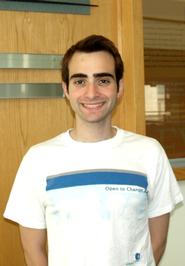
The Israeli-Palestinian conflict is at the forefront of Middle Eastern news coverage, but another conflict of nearly equal importance taking place within the borders of Israel has largely escaped media coverage. As a Levitt Summer Research Fellowship recipient, Joshua Yates ’14 is researching the internal struggle between Israel’s secular Jewish population, which identifies with Judaism but does not strictly adhere to Jewish law, and its ultra-orthodox population of Haredim. He is working with Professor of History Shoshana Keller.
The Haredim, a small but politically privileged and influential group, see the Jewish state in which they live to be a sinful challenge to God’s promise to deliver the Jews back to the Holy Land. They refuse to enter the Israeli economy, shun modern technology and even receive stipends from the Israeli government to allow them to study the Torah rather than hold jobs. Yates, a world politics major with a concentration in the Middle East, is studying the conflicts emerging between the Haredim and the increasingly frustrated secular Jewish majority. He is also studying the internal sub-conflict between the older, more conservative generation of Haredim and the younger and increasingly modern generation of Haredim.
The Haredim initially opposed the formation of the Jewish State in the late 1940s, but many agreed to move to Israel after the Israeli government under Prime Minister David Ben-Gurion granted the Haredim special privileges – including exemption from compulsory military service, financial assistance and even judicial authority on many cultural matters – in part out of pity for their disproportionate suffering during the Holocaust. The Israeli government did not anticipate the Haredim becoming a major economic or social issue because of their age and relatively small number; however, the Haredim unexpectedly had children at a birth rate much higher than secular Israelis, leading to a growing economic burden on the state and increasing political influence for the Haredim.
Today, there is what Yates describes as a “palpable hatred” of the Haredim by the secular Israeli majority because of these privileges, and the older generations of the Haredim share a similar sense of disgust for secular Israelis and even their nation as a whole. Yates cites the Israeli parliament’s uncompromising and gridlocked handling of the recent expiration of the “Tal law,” which has ended military service determents for the Haredim, as illustrative of the conflict as a whole.
Yates has also focused his attention on the divide between the older generations of Haredim who refuse to enter the economy or serve in the military and the younger Haredim who are increasingly getting jobs and even taking up military service. Some of these younger Haredim are even calling for their people to normalize into Israeli society, a goal that is flatly opposed by older generations.
After conducting exclusive research on the two conflicts, Yates can quote facts, proposals and sources of tension as if he has written a book on the issue, but even he cannot see an easy solution. He predicts that over the next few years, younger Haredim will increasingly enter secular Israeli society and Haredim religious leaders will be unable to react to mounting internal divides. Yates hopes that Haredim will eventually successfully merge with modern Israeli society while preserving their heritage, but he believes that secular backlash against the Haredim will continue to make this merger difficult.
He explained the inevitability of the clash between secular Judaism and the Haredim by remarking, “Israel has never had a reformation as Christianity did. Is Israel a Jewish state or a state of Jews? The difference is important, and until Israel answers this question, the conflict will remain.”
Yates is a graduate of East Brunswick High School (N.J.)
